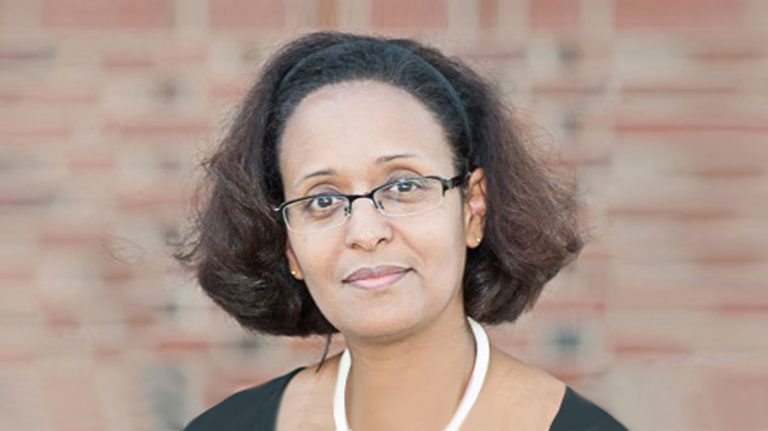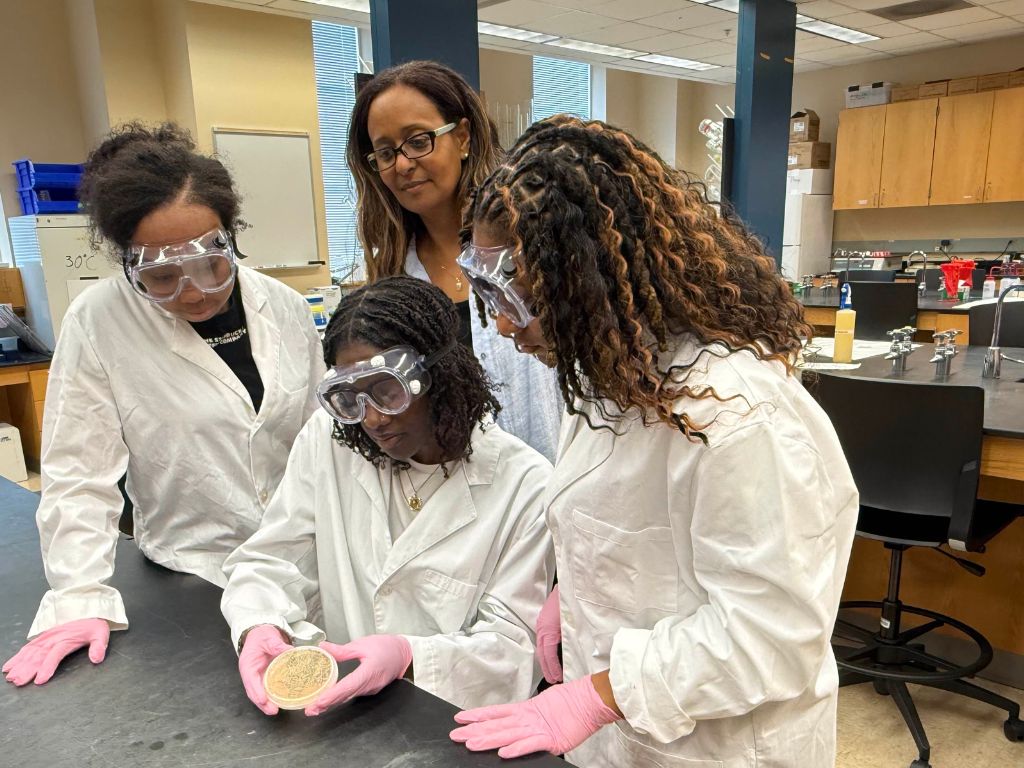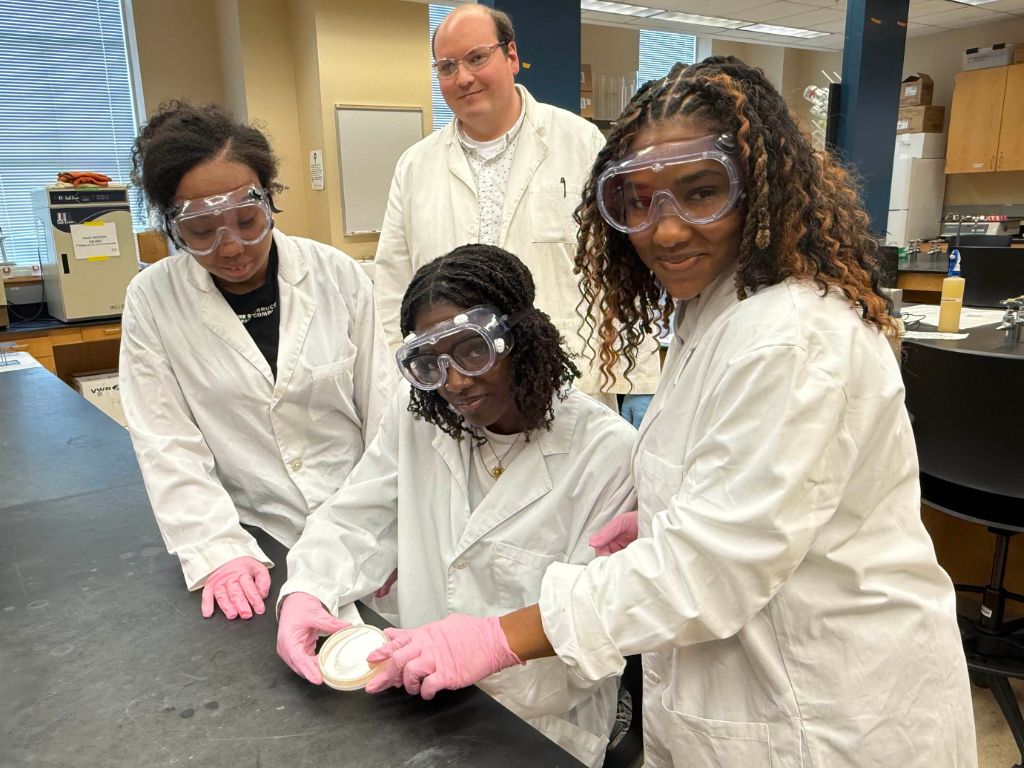Mentewab Ayalew Secures $483,620 NIH Grant to Transform Genomic Data Science Education
New curriculum addresses critical shortage of biomedical data scientists while positioning HBCU students at forefront of precision medicine revolution.
 A $483,620 federal grant is about to transform how Spelman College prepares the next generation of biomedical scientists — and it couldn't come at a more critical time. Mentewab Ayalew, Ph.D., a professor of biology whose students have earned spots at some of the nation's most prestigious graduate programs, has secured three years of funding from the National Institutes of Health to build an integrated genomic data science curriculum. The investment addresses an urgent national need: the biomedical research workforce is facing a severe shortage of professionals trained to manage the massive datasets that are now driving breakthroughs in cancer research, human genetics, neuroscience, and disease prevention.
A $483,620 federal grant is about to transform how Spelman College prepares the next generation of biomedical scientists — and it couldn't come at a more critical time. Mentewab Ayalew, Ph.D., a professor of biology whose students have earned spots at some of the nation's most prestigious graduate programs, has secured three years of funding from the National Institutes of Health to build an integrated genomic data science curriculum. The investment addresses an urgent national need: the biomedical research workforce is facing a severe shortage of professionals trained to manage the massive datasets that are now driving breakthroughs in cancer research, human genetics, neuroscience, and disease prevention.
"Highly efficient processes for generating sequence and other high throughput data have profoundly transformed the field of biomedical science," Ayalew explains. "Research in cancer, major diseases, human genetics, neuroscience, and behavior is now data-driven in ways that were unimaginable just a decade ago."
The paradigm shift has been dramatic. Biomedical data has essentially transformed many areas of research into new branches of information science, creating what Ayalew identifies as a critical skills gap in the research workforce.
Building a Community of Practice

Her solution is both ambitious and practical: four interconnected modules woven throughout Spelman's biology curriculum, from introductory courses serving 50-80 students to specialized electives and hands-on research experiences. Six faculty members — Drs. Dongfang Wang, Nazia Mojib, James Melton, Steve Kioko, Ethan Rundell and India Nichols-Obande — will collaborate with Ayalew to ensure that genomic data science concepts are reinforced across multiple courses and contexts.
The curriculum's first module tackles MSH2 variants associated with colon cancer through Bio 125, Molecular Biology and Genomics. Taught by a six-member faculty team across four sections, the course will introduce 50-80 first-year students each semester to cloud-based computing, association studies, and data privacy and ethics—foundational skills for modern biomedicine.
India Nichols-Obande, Ph.D., assistant professor of biology, will launch a new 300-level course on genome-wide association studies of sleep and circadian biology, serving 12 students per semester in advanced data science techniques. In the future, a course will guide approximately 30 students annually through Bio 332, Microbiology, where they will learn to retrieve pathogen data and perform analytics using Google's Gemini AI.
The pride and joy of Ayalew is her own undergraduate research course, where approximately 10 students each year contribute to her microbiome research conducted in collaboration with North Carolina State University and Johns Hopkins University—work soon to be published in Nature Genetics, one of the field's top-ranked journals.
For Ayalew, this interdisciplinary approach is deeply personal. "I always knew I would never confine myself to one thing," she reflects. "I was interested in everything. I liked all the STEM fields but also had an appreciation for the humanities and the social sciences. I like interdisciplinarity. We have to go where knowledge takes us. We should embrace interdisciplinary collaboration."
Her students see the impact firsthand. "The semester has just begun, and you've already opened doors for students like me, who want to become physicians, to develop independent thinkers," says Skyy Lewis, C’2026, a junior biology major on the pre-med track and certified clinical medical assistant.
"I have the opportunity to work with Dr. Ayalew in a classroom setting and a research environment which allows me to see your duality, commitment, and passion for this project. By working closely with you, Tobias, Nonie, and several colleagues I've been able to embrace my curiosity, stay up to date on current advancements, network, and overall build my confidence in navigating roadblocks."
A Decade of Student Success
That philosophy has defined her decade at Spelman.
An important driver of my work at the College has been a genuine embrace of the liberal arts and its teacher-scholar model," Ayalew says. "My scholarship, teaching, and service are deeply integrated and centered on student growth."
The results speak for themselves. Over the past 10 years, Ayalew has trained 62 students in her laboratory, guiding them to deliver 95 presentations at professional meetings—earning 17 awards—and 11 of them co-authoring publications. Recent accolades went to Lauren Smith who won first place at the Southern Section of the American Society of Plant Biologists in 2021. Kathleen Bostick earned the prestigious Astronaut Award in 2023 and co-authored two papers. Two students, Katherine Ulbricht and Nia Davis, were invited to present at the Galaxy workshop during the Plant and Animal Genome Conference in 2024 and co-authored the forthcoming Nature Genetics manuscript.
Several of her mentees have gone on to matriculate at some of the nation's most competitive graduate and professional programs.
"The interdisciplinary space has always been fertile ground for basic research and innovation," Ayalew notes. "It is also a meaningful way of engaging students with real world problems."
The NIH award will dramatically expand student engagement with pressing scientific challenges— from understanding cancer-associated genetic variants to analyzing pathogen data and exploring how metal pollution affects microbiome health. The curriculum represents what Ayalew calls "a more concerted and coordinated effort to adapt our curriculum to modern biology," with eight faculty members sharing expertise and supporting each other as they guide students through complex genomic data science.
"I want students to know you don't have to narrowly fit in one lane," Ayalew emphasizes, a message now embedded in the very structure of the new curriculum.
Beyond her laboratory work, Ayalew serves as co-director of LINCS (Living and Learning in an Interdisciplinary Networked Community of Scholars), a program celebrating its 10th anniversary this year. The initiative supports 15-20 STEM students annually through individualized guidance and sustained mentoring relationships.
Of her 13 publications from the last decade, seven are explicitly interdisciplinary, including work featured as the 2023 Editor's Pick in PRIMUS, co-authored with colleagues from Spelman's Biology, Physics, and Mathematics departments.
Preparing Leaders for a Data-Driven Future The timing of the NIH investment couldn't be more crucial. The demand for genomic data scientists is exploding—the NIH estimates a shortage of tens of thousands of trained professionals in the coming decade as precision medicine, personalized cancer treatments, and population health initiatives accelerate. Yet people of color remain dramatically underrepresented in computational biology and bioinformatics fields, limiting the diversity of perspectives brought to bear on health disparities and disease research.
The timing of the NIH investment couldn't be more crucial. The demand for genomic data scientists is exploding—the NIH estimates a shortage of tens of thousands of trained professionals in the coming decade as precision medicine, personalized cancer treatments, and population health initiatives accelerate. Yet people of color remain dramatically underrepresented in computational biology and bioinformatics fields, limiting the diversity of perspectives brought to bear on health disparities and disease research.
"These resources create invaluable opportunities for students like me who want to pursue research-based careers," says Nonie Shuford, C'2026, a senior biology major and food studies minor exploring immunology, cancer research and nutrition science.
"They provide access to essential tools, career preparation, and on-campus research experiences that help us become competitive applicants for post-graduate opportunities. Sequencing and genomic techniques are used so often in biological research, so having exposure to these technologies now ensures that Spelman students are prepared to thrive in future academic and professional settings."
Shuford continues: "This initiative allows us to build technical skills, deepen our passion for research, sharpen our problem-solving abilities, and grow within a supportive community of peers. I am especially grateful for the chance to learn from and be mentored by Dr. Ayalew, both in the classroom and the laboratory."
Ayalew's curriculum positions Spelman students at the forefront of this transformation. For students wondering if they belong in genomic data science, the message is clear: the field needs diverse perspectives now more than ever. The questions being asked about human health, disease, and the environment require minds that can bridge disciplines and bring fresh approaches to long-standing challenges.
"Whether through mentorship in the lab, collaborative research, or scholarship with students, I am dedicated to fostering interdisciplinary inquiry and student development," Ayalew reflects. "This work is among the most rewarding aspects of my career."
With the NIH's investment, that dedication now extends to preparing an entire generation of Spelman students not just for careers in the data-driven future of biomedical science—but to lead them.
